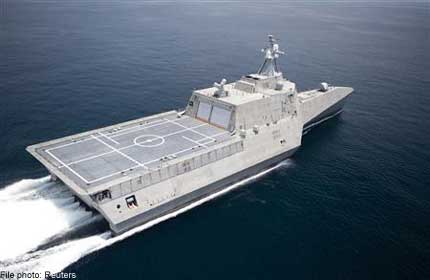- Joined
- Aug 14, 2009
- Messages
- 3,634
- Points
- 0

WASHINGTON - The US Navy will station several new coastal combat ships in Singapore and perhaps in the Philippines in coming years, moves likely to fuel China's fears of being encircled and pressured in the South China Sea row.
Last month, the United States and Australia announced plans to deepen the US military presence in the Asia-Pacific, with 2,500 US Marines operating out of a de facto base in Darwin in northern Australia.
The US Navy will increasingly focus on the strategic"maritime crossroads" of the Asia-Pacific region, Chief of Naval Operations Admiral Jonathan Greenert wrote in the December issue of Proceedings, published by the US Naval Institute.
He said the navy planned to "station several of our newest littoral combat ships at Singapore's naval facility," in addition to plans announced by President Barack Obama to start rotational deployments of marines to Darwin from next year.
"This will help the navy sustain its global forward posture with what may be a smaller number of ships and aircraft than today," he wrote.
Littoral combat ships are shallow draft vessels that operate in coastal waters and can counter coastal mines, quiet diesel submarines and small, fast, armed boats.
"Our ships in Singapore will conduct cooperative counter-piracy or counter-trafficking operations around the South China Sea," Greenert wrote.
"Similarly, 2025 may see P-8A Poseidon aircraft or unmanned broad area maritime surveillance aerial vehicles periodically deploy to the Philippines or Thailand to help those nations with maritime domain awareness."
One source briefed on navy plans said there has also been discussion about stationing ships in the Philippines.
The disputed ownership of the oil-rich reefs and islands in the South China Sea is one of the biggest security threats in Asia. The sea is claimed wholly or in part by China, Taiwan, the Philippines, Malaysia, Vietnam and Brunei.
The shortest route between the Pacific and Indian Oceans, it has some of the world's busiest shipping lanes. More than half the globe's oil tanker traffic passes through it.
Obama told Chinese Premier Wen Jiabao at a regional summit in November that the United States wanted to ensure the sea lanes were kept open and peaceful. Wen said "outside forces" had no excuse to get involved in the complex maritime dispute, a veiled warning to the United States and other countries to keep out of the sensitive issue.
The new de facto US base in Australia expands the direct US military presence in Asia beyond traditional allies South Korea and Japan and into Southeast Asia. US officials described it as a policy "pivot" toward Asia as wars in Iraq and Afghanistan wind down.
CLOSELY WATCHED
These developments on the littoral combat ships (LCS) are being closely watched by Lockheed Martin Corp, Australia's Austal, General Dynamics Corp and other arms makers that are building two models of the new warships for the US Navy, and hope to sell them to other countries in coming years.
"Because we will probably not be able to sustain the financial and diplomatic cost of new main operating bases abroad, the fleet of 2025 will rely more on host-nation ports and other facilities where our ships, aircraft, and crews can refuel, rest, resupply, and repair while deployed," Greenert wrote in the naval magazine.
Ernie Bower, who is with the Center for Strategic and International Studies, said the emerging strategy for Southeast Asia would be far different from the big US bases established in Japan and South Korea in the last century.
"We're exploring a new arrangement with a smaller footprint, that is mission-specific, and culturally and politically more palatable to countries," he said, adding that it would be difficult for Washington to drum up much political support for big bases in the region. Forward-stationing versus permanent bases would also save the navy money, he said.
Greenert did not provide a timetable for the LCS stationing in Singapore.
Navy Secretary Ray Mabus is traveling in Asia this week, but has no plans to stop in Singapore or the Philippines, a according to a spokeswoman for his office.
Bilateral military ties between the United States and Singapore have continued to grow since the two countries signed a strategic framework agreement in 2005. They have engaged in joint training, military exercises and ship visits.
The Lockheed-built USS Freedom littoral combat ship is in San Diego for tests and trials after undergoing maintenance. Operational details about the expected date and destination of the ship's first deploymenton are "still under discussion," said Navy spokesman Commander Jason Salata.
